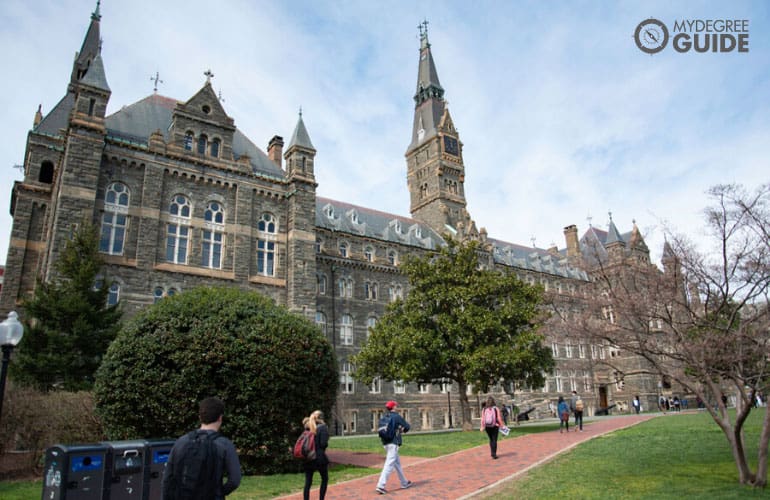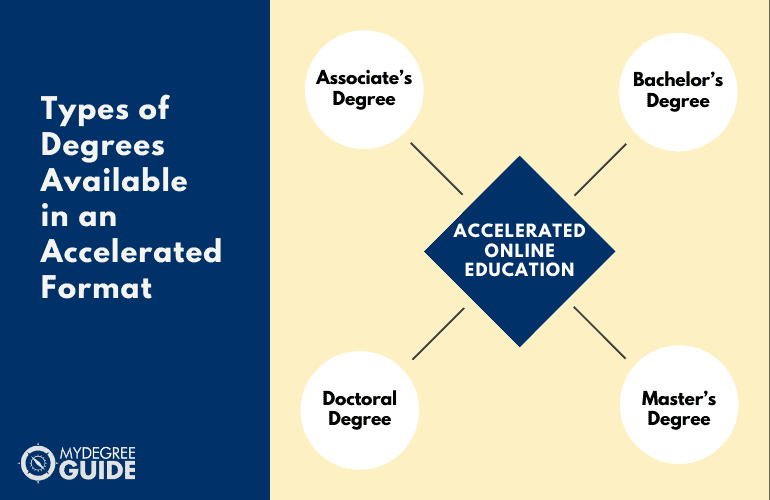Here are the 30 Best Accelerated Degree Programs Online for 2024. Accelerated bachelor’s degrees can help you finish college faster.

Accelerated degrees can help you finish college in less time.
Editorial Listing ShortCode:
Accelerated bachelor’s programs can help you finish college faster:
- Earn your college credits more quickly
- Freedom to take a full-time course load without over-extending yourself
- Complete your degree 100% online
- Save money on tuition
Earning your college degree is a major accomplishment, but that doesn’t mean you have to spend four years sitting in a college classroom.
Accelerated Degree Programs by College Major
There are a number of accelerated bachelor’s programs offered online by reputable universities.
By taking fast track courses online, you can finish your degree in less time than you would sitting on campus.
Accelerated 8-week online classes are available for these college majors:
- Accounting
- Business Administration
- Communications
- Computer Programming
- Computer Science
- Counseling
- Criminal Justice
- Education
- Emergency Management
- English
- Finance
- Fire Science
- General Studies
- Healthcare Administration
- Health Science
- History
- Hospitality Management
- Human Resources
- Human Services
- Information Technology
- Liberal Arts
- Marketing
- Nursing (RN required)
- Political Science
- Project Management
- Psychology
- Sociology
- Sports Management
Whether you want to finish your degree in two years or less time, there are accredited universities offering accelerated classes in a wide range of majors.
This guide will put you in the driver’s seat of your degree program. With new and creative ways to earn your degree at a faster pace — like credit for life experience or credit by exam — these proven methods can quickly add college credit hours to your transcript without stepping foot in a college classroom.
Accounting

The field of accounting is projected to grow by 11% in the next 7 years, with jobs in fields like manufacturing, government, and insurance.
The U.S. Bureau of Labor Statistics notes that the average income for accounting degree holders is $71,550. The top 10% of accountants made more than $124,450 per year, making accounting a potentially lucrative option.
Editorial Listing ShortCode:
As part of your accounting curriculum, you can expect to take courses such as financial management, managerial accounting, taxation, risk management, and accounting information systems.
Business Administration

The average salary for business degree holders is $63,000. For those who advance to managerial and executive level positions, the pay is substantially more.
According to a report by the National Association of Colleges and Employers, 86% of employers intend to hire college graduates with a degree in business administration.
Editorial Listing ShortCode:
Some examples of curriculum include business law, strategic management, global business, finance, and project management. With a business degree, you could pursue a career in management, financial advising, consultancy, marketing, and even media.
Communications

A bachelor’s in communications degree prepares you for a variety of careers.
Editorial Listing ShortCode:
Some career options include broadcasting, advertising, film, journalism, sports reporting, visual communications, and web design.
Computer Programming

If you are on the fence about whether to pursue a career as a computer programmer, the Bureau of Labor Statistics shows that 93% of STEM careers command wages above the national average.
The Bureau of Labor Statistics shows the median among all earners is $86,550 with a bachelor’s in computer programming.
Editorial Listing ShortCode:
Some of the courses you can expect to take in this degree include Java Programming, SQL Fundamentals, and Designing and Programming an Application.
Computer Science

Forbes ranks a bachelor’s degree in computer science as one of the top earning degrees.
The U.S. Bureau of Labor Statistics indicates that the median annual wage is $86,550 and estimates that there will be 4.4 million jobs in computer and technology fields by 2024.
Editorial Listing ShortCode:
Some common courses include programming, system architecture, data structures, operating systems, and cloud computing.
Counseling

The Bureau of Labor and Statistics estimates that there will be 20% job growth for counselors over the next ten years. That is faster than the average of all occupations.
Although you can’t become a licensed counselor with a bachelor’s degree in counseling or human services, it is your first step when pursuing a career in counseling.
Editorial Listing ShortCode:
Some possible careers include case management, crisis intervention specialist, life coach, and group home facilitator.
Criminal Justice

The Bureau of Labor Statistics (BLS) estimates an increase of 5% in criminal justice jobs over the next 10 years. Having a bachelor’s degree in criminal justice or previous law enforcement or military experience drastically increases your job prospects.
The BLS lists the median annual pay for criminal justice professionals at $65,170 with the top 10% of earners making more than $109,620.
Editorial Listing ShortCode:
Some examples of careers in this field are police, detective, homeland security, and federal agent.
Education

The Bureau of Labor Statistics shows that salaries in the education field will depend largely on the grade you are teaching.
As an example, the median salary for high school teachers is $61,660, while elementary teachers have a median of $62,310. Interestingly, the top 10% of earners make $99,600.
Editorial Listing ShortCode:
Some of the courses you might see as part of your bachelor’s in education curriculum include classroom management, learning theory, child psychology, and instructional planning.
Emergency Management

Being trained with a bachelor’s in emergency management can help you enter a career with growing job opportunities.
The Bureau of Labor Statistics states that emergency management positions are experiencing a steady growth of 8% over the next 10 years. The median salary for emergency management degree holders is between $74,590 with the top 10% of earners bringing in $141,230 annually.
Editorial Listing ShortCode:
Common courses include emergency preparedness, disaster response, anti-terrorism, airport security, and risk mitigation.
English

English degrees all involve a focus on reading, writing, and analyzing the English language, usually through literature and writing assignment. But there are many different slants that a degree in English can take.
Editorial Listing ShortCode:
Common courses found in a bachelor’s in English program include American literature, comparative literature, technical writing, creative writing, and literary journalism.
Finance

Finance is a burgeoning field with an expected job market increase of 8% in the next 10 years.
The employment world of finance is as varied as the ways you earn money. From analysts, managers, and advisors, there is a niche for you if you are ambitious and love numbers and computing figures. After graduation, you can expect to make an average of $66,500 per year.
Editorial Listing ShortCode:
Common courses in a bachelor’s in finance program include financial accounting, investments, strategic management, financial markets, and managerial accounting.
Fire Science

A bachelor’s in fire science degree prepares you for a field that is becoming increasingly professional. It’s not just about fighting fires anymore.
Your degree can teach you skills like administration, facilitation and team organization, as well as leadership.
Editorial Listing ShortCode:
With such a wide range of jobs available, it is not surprising that there is a predicted job increase of 8% by 2024. Jobs in emergency management are becoming more necessary as situations become more complex.
General Studies

A bachelor’s degree in general studies is your stepping stone, either into another bachelor’s degree, into an entry-level position, or into graduate school.
You can make your general studies degree more valuable by including courses like marketing, sales, business, social media, graphic design, data analysis, computer programming, IT, communications, management, research, and operations.
Editorial Listing ShortCode:
You can use a general studies degree to enter a wide-range of careers that require a bachelor’s degree as a minimum requirement for getting the job.
Healthcare Administration

Healthcare administration is one of the fastest growing occupations, with the Bureau of Labor Statistics estimating there will be over 300,000 new jobs in the next 10 years.
The median annual wage for medical and health services managers is $100,980, with the top 10% of earners making $189,000.
Editorial Listing ShortCode:
Although you can enter the field with a bachelor’s degree in healthcare administration, master’s degrees are becoming increasingly common.
Health Science

Healthcare, in general, is a large and booming field. There are over 12.2 million jobs that are classified as health science careers. Your salary could be just as diverse from $21,020 on the lower end to $187,200 on the high end.
A bachelor’s in health science degree will typically be geared toward one of three different tracks: Health Administration, Public and Community Health, or Fitness Management.
Editorial Listing ShortCode:
Getting a degree in health science allows you to enter the world of health care, which continues to be one of the most in-demand occupations.
History

Our reality is shaped by the historic events of yesterday from colonialism, disease epidemics, immigration, wars, industrialization, culture shifts, and environmental phenomena.
Take that understanding and apply to situations today as a political scientist, economist, or teacher with a bachelor’s degree in history.
Editorial Listing ShortCode:
Common courses include American history, public history, political history, military history, history of Asia, and Middle Eastern history.
Hospitality Management

The type of hospitality management degree you take will depend on which direction you want to go with your career: tourism, event planning, food services, or lodging.
Editorial Listing ShortCode:
The classes offered in a bachelors in hospitality management degree expands the knowledge that you have from working in hospitality to give you the practical knowledge that you will need to best serve your customers.
Human Resources

Every industry, company, and organization with more than 25 employees typically has a human resources department. These companies include law firms, hospitals, universities, restaurant chains, and financial services.
The Bureau of Labor Statistics shows the median annual wage for human resources specialists is $61,920. The top 10% of earners made more than $105,930. It’s also estimated that the job market for human resources will grow by 7% in the next ten years.
Editorial Listing ShortCode:
Common classes in your bachelor’s in human resources degree plan might be human resource management, building effective teams, managing organization change, training and employee development, and staffing the organization.
Human Services

A bachelor’s in human services degree could start you on the path to a career in social work, child care, gerontology, rehabilitation, and counseling.
You would be prepared to deal with complex ethical, cultural, and economic situations all with the goal of helping people to make their lives better.
Editorial Listing ShortCode:
Common curriculum in this bachelors program includes social science research methods, family and community systems, law and ethics in human services, child growth, and cognitive development.
Information Technology

The Bureau of Labor Statistics (BLS) estimates that jobs related to computers and information technology will grow by 12%. That is more than double the average. You are looking at nearly 500,000 new jobs in the next 7 years.
The BLS indicates that the median wage for computer and information technology occupations is $88,240, which is more than double the median national wage.
Editorial Listing ShortCode:
Common courses in a bachelor’s in information technology degree program may include computer programming, network administration, database administration, web architecture, and even game development.
Liberal Arts

The Bureau of Labor Statistics states that no matter what industry you are interested in you will need to be able to solve problems, write well, speak well, be cross-culturally competent, and be a good manager. That is the goal and foundation of a liberal arts degree.
To be successful with a bachelor’s in liberal arts degree, you will need to view your degree as a starting or launching point.
Editorial Listing ShortCode:
Add to your degree with knowledge and skills in a specific field, like marketing, sales, business, social media, graphic design, data analysis, computer programming, IT, communications, management, research, or operations.
Marketing

Marketing involves creativity and doing things differently to stand out from the crowd.
Monster.com reports that International Marketing Executives earn upwards of $282,100 per year. According the Bureau of Labor Statistics, the national average salary for marketing managers is $131,180 a year.
Editorial Listing ShortCode:
You typically won’t reach those salary levels fresh out of school. The average starting salary is closer to $53,400 annually.
A bachelor’s in marketing typically includes courses like consumer behavior, e-commerce, internet law, digital marketing, customer retention, and conversion optimization.
Nursing (RN to BSN)

For those who enter the field of nursing, you are in good company. With the Bureau of Labor Statistics showing a median annual salary of $73,300, more and more nurses are seeking out accelerated nursing degree programs to take their careers to the next level.
Accelerated programs help those with their RN earn their Bachelor of Science in Nursing (BSN) at a faster pace than they would through traditional, campus-based classroom programs.
Editorial Listing ShortCode:
With an accelerated BSN program, go beyond the topics covered in an associate’s program and also learn about social and physical sciences, nursing management, public health, and humanities.
Political Science

A bachelor’s degree in political science gives you the opportunity to study how a state is governed and to look closely at how the different government institutions function.
Editorial Listing ShortCode:
You degree will cover topics such as historical and cultural influences on government. You will look at how political processes came about and what it all means for how politics, the economy, and society are connected.
Project Management

A bachelor’s in project management degree gives you the skills that will prepare you to lead your team well and ensure that each project finishes successfully.
The Bureau of Labor Statistics estimates there will be at least 807,300 new jobs in project management available by 2026.
Editorial Listing ShortCode:
Common courses include project management, organizational leadership, leading global projects, marketing, supply chain management, and business information technology.
Psychology

Psychology is an in-demand field with a 19% growth rate according to the Bureau of Labor Statistics.
Although a bachelor’s degree in psychology will not make you a doctor or a psychologist, it is the first step to becoming a psychologist.
Editorial Listing ShortCode:
Studies show that up to 40% of psychology majors will go on to complete graduate studies in psychology, but you can begin a different career with a psychology degree. You can also work in marketing, sales, advertising, rehabilitation, real estate, social work, child care, and parole and career counseling.
Sociology

Sociology degrees are famous for producing students that have an appreciation of diversity, a love of learning, writing and research skills as well as a knowledge base about human behavior, social organization, culture, and social change.
A sociology degree does not mean you will become a sociologist. You can take your degree in many different career directions such as teaching, marketing, journalism, law, politics, and consulting.
Editorial Listing ShortCode:
Common courses included in a bachelor’s in sociology program include contemporary race-ethnic relations, forensic anthropology, gender and society, environmental justice, global environmental issues, and social problems.
Sports Management

A bachelor’s in sports management degree can prepare you to become an active and integral participant in the behind the scenes actions of the vibrant sports industry.
Editorial Listing ShortCode:
You can be part of this exciting industry and work behind the scenes as an event coordinator, athletics administrator, sports marketer, and guest relations manager.
Accelerated Bachelor’s Degrees Online

The 2 main types of Bachelor’s degrees are a Bachelor in Arts (BA) and a Bachelor in Science (BS). Often, there’s little distinction between the two.
For example, you could earn your bachelor’s in business management or construction management as either a BA or BS, depending on the school. On the other hand, if you are interested in a bachelor’s in biology, that will most likely be offered as a bachelor of science program.
One degree to note is the Bachelor of Science in Nursing (BSN), which allows a nurse already practicing as an RN to earn a BSN through an accelerated BSN program. This is ideal as a nurse’s shift work will often not accommodate traditional classroom study. An accelerated BSN program allows a working RN to take online classes around night shifts and 12 hour days.
Editorial Listing ShortCode:
Graduating with a Bachelor’s degree takes 120 credit hours, which is often spread out over 4 years. But if you take an accelerated bachelor’s degree online, you could be done in 2.5 years. That’s pretty fast for completing your undergraduate degree.
Here’s how:
- Use Credit by Examination (CBE) to test out of 15-30 credit hours. Check first with your school on the maximum CBE credits they allow. If you test out of 30 credit hours, that would cut off 2 semesters from your schooling.
- Add Credit for Prior Learning (CPL) credit. Most schools will allow up to 15 credits for this. That would knock off another semester.
- Take 2 online classes every 8 weeks, giving you 6 credit hours per term. In 6 terms (1 year), you would have 36 credits. In 2 years and 24 weeks, you would earn 90 credit hours.
The fast pace of an accelerated bachelor’s degree would prepare you for a job in any field! It will take a lot of effort, but it is possible with a bit of dedication and a strong work ethic.
Accelerated Online Degree Programs for Working Adults

As a working adult, the dream of completing a degree program seems hopeless. You are already working hard. You don’t have extra time, and you can’t quit your job to go back to school. It feels like you are stuck.
An accelerated program for working adults is the ideal fit for your lifestyle. There is no commute, no hours spent in class, no awkward class schedule. You can log in anytime and anywhere. You can choose from a variety of popular majors from many top schools.
Editorial Listing ShortCode:
Many schools will also have payment plans available, so you don’t even have to go into debt. Also, you can check with your employer if they have a tuition reimbursement program available.
Whether you already have 59 credits or zero, you can start right away and finish in far less time than you think. Without putting your already busy and full life on hold.
Accelerated Online Degree Completion Programs

An accelerated online degree completion program is for you if you started university or college but something happened and you weren’t able to complete your degree.
But not all hope is lost. You can still complete your degree online. As long as you already have earned at least 60 credits you can apply to finish your degree at a different university than you first attended. Often known as a 2+2 degree.
Editorial Listing ShortCode:
Using accelerated studies to complete your degree will allow you to have the chance to finish your degree without quitting your job or moving back to your old university.
Competency Based Degrees

A competency-based degree allows you to work at your own pace and submit an assessment or portfolio once you have mastered the material in the course. There are no grades assigned. Only a pass or fail is given. Of course, you will get a pass!
Classes are scheduled in 3 to 6-month terms and are offered online. You are your own teacher! You set your own schedule and will work independently. You can quickly move through the classes you have already mastered.
Competency based programs allow you to focus on developing an understanding of real-world skills. Skills you will actually use in employment after you graduate with your degree. No sitting through pointless classes.
Typically, you will pay tuition for one 3-6-month term and can complete as many competency units as possible during that time. That’s right. You are not limited by what is offered in a certain semester. As a motivated learner, you can quickly complete units and get through many courses each term.
Accelerated Schools

If you are trying to find an accelerated school, please don’t Google “accelerated schools.” They don’t really exist! An accelerated school is just a traditional college with a regular brick and mortar campus that also happens to offer online classes you can take at an accelerated pace.
Online classes are typically offered in 8-week terms. You can take 2 classes at a time (sometimes even 3) in an 8-week term, which will speed you through faster than a traditional program.
You can choose how fast you go through the program by taking advantage of the accelerated classes and max out your course load by taking 2 online classes at a time.
Are Fast Online Degrees Legitimate?

Earning a degree is a huge commitment. It takes a lot of effort and money. You want to make sure that the degree you earn is legitimate and is not going to end up being worthless.
Although online degrees are fairly new in the education world, they are quickly gaining acceptance. A study conducted by NYU found that employers who have had experience with online classes are twice as likely to hire a candidate with an online degree.
The study concludes “as more people attend online schools over time and the number of graduates of online schools sitting on the hiring side of the desk increases, we can anticipate more favorable treatment of online university graduates.”
Online degrees are becoming more commonplace with a reported 5.8 million students having taken an online course (reported by the Babson Survey Research Group). Almost half of those students have taken all of their courses online or through distance education.
Editorial Listing ShortCode:
Accelerated online classes are offered by many well known reputable universities such as Colorado State University, Northeastern University and Boston University. Even educational giants like Harvard are starting to offer online classes for credit.
We can obtain almost anything we want online, and the value of doing so is becoming more commonplace. But just as you have to check that the iPhone you order off eBay is legit, you want to check that your online program is also legitimate.
Regional accreditation is the gold standard for degree programs. You will want to check that your school is recognized by the Department of Education or the Council for Higher Education Accreditation. Accelerated online classes are widely available and accepted by these institutions. The degree that you earn will not have any notation on it that your class was taken online. Your transcript will only show that you completed the class and the mark you received.
When you earn an MBA from Colorado State University, for example, that is what you will have to show your employer. Your MBA taken via online accelerated classes has no asterisk saying *not a real degree. A degree granted from a reputable university is a degree. Few employers will question which of your classes were online or in class.
Accelerated Courses vs. Traditional Courses – The Pros and Cons

It is a hard decision to make whether you should go the traditional route of taking a class or whether you are ready to try an accelerated course. Neither option is perfect. Both options do have pros and cons to consider.
An accelerated course offers you more flexibility. You can complete your classwork on your own schedule. You can work anywhere, anytime – from your office, on your lunch break, or during your summer vacation at the beach.
Accelerated courses are faster to complete, typically running 8 weeks.
Location doesn’t matter. Maybe you are living in a rural location with no colleges available to you. Or the program you want isn’t offered at your local college. Accelerated online courses allow you to take a class from any college anywhere. You could be living in Alaska taking a course from the University of Texas.
Your choice of colleges will not be limited to where you live. There is no uprooting your family to complete your degree.
Accelerated courses also cost less both in tuition and associated class expenses.
You can find accelerated courses that are given the same accreditation as a class offered in a classroom.
The downsides of completing a course online really come down to you. What you are willing to do.
You will need to be independent. You will not be interacting with a teacher face to face. You will have to find the strength in yourself to be self-disciplined and remain focused when it gets tough. Because it will be tough!
There are some majors that require in-person instruction, such as an MD, biochemistry, and sonography. These would not be a good fit for an online accelerated course.
How to Earn Your College Degree Faster
Many colleges around the country offer options for accelerated classes that are completed on a shorter schedule than a traditional college course.
- Accelerated classes
- Credit by examination
- Credit for prior learning/life experience credit
- Get college credit for military training (if applicable)
- Advanced placement and dual enrollment options
This gives you the opportunity to cover more ground in your degree program in a shorter time-frame, helping you get one step closer to graduation.
Time to Completion – How to Earn Your College Degree in Under Four Years
You might be thinking that an accelerated program sounds like a great idea, but how does it really work?
There are several proven strategies that we will show you that can help you accelerate the completion of your degree.
The table below will give you an idea of one of the ways this could work. In this example, the student has military experience, but you may have work experience that would provide you with a similar amount of college credit.
| Pre-College | |
| Credit Method |
College Credits Earned |
| Military training credit |
21 |
| First Year of College | |||
| Start Date | End Date | Quick Degree Strategy |
College Credits Earned |
| August | October | Accelerated online classes (max course load) |
6 |
| October | December | Accelerated online classes (max course load) |
6 |
| January | January | External Learning |
3 |
| January | February | Accelerated online classes (max course load) |
6 |
| February | April | Accelerated online classes (max course load) |
6 |
| February | April | Credit for Prior Learning Portfolio |
18 |
| First Year Total |
45 credit hours |
||
| Summer Between First & Second Year of College | |||
| Start Date | End Date | Quick Degree Strategy |
College Credits Earned |
| May | May | Credit by Exam: CLEP (Social Sciences & History) |
6 |
| May | June | Accelerated classes (max course load) |
6 |
| June | June | Credit by Exam: CLEP (College Composition) |
6 |
| June | August | Accelerated classes (max course load) |
6 |
| July | July | Credit by Exam: CLEP (Natural Sciences) |
6 |
| Summer Total |
30 credit hours |
||
| Second Year of College | |||
| Start Date | End Date | Quick Degree Strategy |
College Credits Earned |
| August | October | Accelerated online classes (max course load) |
6 |
| October | December | Accelerated online classes (max course load) |
6 |
| January | February | Accelerated online classes (max course load) |
6 |
| February | April | Accelerated online classes (max course load) |
6 |
| Second Year Total |
24 credit hours |
||
| Total Credit Hours |
120 credit hours |
||
Obviously, this is just one possibility. Instead of military training credit, you might already have 21 hours of transfer credit. Or your school might offer 6 terms instead of 5. The strategies are completely flexible to YOUR own experience and your particular college’s schedule and courses.
Admissions Requirements
This is the easiest part. Applying to an accelerated program is so simple. Here’s all you need to do:
- Find a college that offers 8-week-long online classes (some even offer 5 week online courses).
- Choose the college that you like and has your major
- Go to the college website
- Apply!
Most fast track programs require the same materials and information as traditional degree programs. These may include:
- A high school diploma or GED
- School transcript(s)
- Minimum GPA
- Personal Statement
- Letter(s) of Recommendation
- Application Fee
- SAT or ACT scores (not required by many online colleges)
Some programs have a minimum age requirement. This age requirement is usually older than when most students begin college and is typically somewhere in the 20’s range. This is because many accelerated or degree completion programs cater to adult learners.
Curriculum

The curriculum for an accelerated degree program is exactly the same as a traditional program curriculum. This means that whatever you would need for an in-person program is what you will need for an online program. Except you get more flexibility and can finish faster.
All universities in the United States will have a similar list of general education requirements. For example, for both an Associate’s and a Bachelor’s degree, you will need to complete 6 credits each in communication arts, mathematics, science and technology, humanities and social science.
An Associate’s degree will require 3 credits of additional liberal arts and 9 credits of interdisciplinary studies. A Bachelor’s degree requires 6 credits of additional liberal arts and 18 credits of interdisciplinary studies.
On top of that, you just need to add the requirements for your major and your electives. Just like a traditional program.
College Accreditation & Reputation

Accreditation is a quality assurance step taken by the federal and state government agencies as well as non-government organizations. It’s a way to make sure universities and colleges are meeting acceptable levels of quality.
Going to an accredited school ensures that the program is high quality and that your degree will be accepted by other universities and your employer. Look to see that any college you apply to is accredited nationally or by one of these regional boards.
- Middle States Commission on Higher Education
- New England Association of Schools and Colleges
- Higher Learning Commission
- Northwest Commission on Colleges and Universities
- Southern Association of Colleges and Schools
- Western Association of Schools and Colleges
Accreditation is another way to safeguard your decision, your time, and your money.
What Are Accelerated Classes?
Think of your typical college course. Now condense it into just a few weeks. It might sound tough, but when you want to cross the finish line sooner, it can be the ideal way to speed up the process of graduation by taking shorter classes online. Typically, these classes are structured in an 8-week format instead of following a traditional 16-week course schedule.
Online accelerated classes are intense but highly flexible, making them a good option if you’re juggling work, school, or family obligations.
Online classes may even give you a leg up on the quality of your education, and Babson Survey Research Group reports that 77% of academic leaders rate learning outcomes for online courses as the same or better than traditional on-campus classes!
Do I Have to Take Accelerated Classes?
While most accelerated programs rely on students taking accelerated courses to quicken the pace of their degree, it’s not necessarily required in all programs. If you enroll in a program that only offers 8-week (or less) courses, then you’ll be required to take accelerated courses. If your program offers 16-week courses, though, you won’t necessarily have to take accelerated courses.
Without accelerated courses, though, it will be difficult to quicken the pace of your degree. The only way you could do so would be by coming into the program with a lot of transfer credits.
Here’s a list of universities offering accelerated online courses.
What Should I Look for in an Accelerated College?
Choosing an accelerated school is one of the most important decisions you will make in your educational journey, and it pays to do your research!
The best colleges are accredited by a regional accrediting body that is recognized by the U.S. Department of Education. If you’re unsure if your school has recognized accreditation, check out the U.S. Department of Education’s website.
Other ways that you can recognize top online schools include:
- College’s name and status
- College’s history
- College resources, such as the library and students services
- Faculty credentials
- Alumni network
When comparing online programs, consider these important factors:
- Admission requirements
- Class and teaching style
- Course content and presentation
- Program length
- Class size
- Student-teacher ratio
- Tuition and financial aid
- Residency requirements
- Ability to transfer credits
When your school is accredited, you can feel confident knowing that they hold themselves to high standards of quality and that your degree will hold weight once you’re ready to venture out into the workforce after graduation.
Job Outlook

In search of quick degrees that pay well? Here’s a list of 10 well paying quick degrees that might interest you.
After all that work of completing your degree, are you going to find a job? Is it going to be worth it? Or are you going to find yourself working at the same job with a worthless degree?
Not according to NACE’s Job Outlook. Approximately 99% of employers plan to hire a graduate with a Bachelor’s degree. That’s 99%! Those with Master’s degrees will be considered for 53% of the jobs. Even doctorate graduates have seen an increase in hiring, with 25% of employers planning to hire doctorate degree graduates.
The U.S. Department of Education reports that adults who hold a college degree make significantly more than adults who don’t. That math is simple.
Editorial Listing ShortCode:
Adults who hold an associate degree make, on average, $37,000 per year. Adults who hold a bachelor’s degree make, on average, $45,000 per year. And adults who hold a master’s degree or higher, on average, make $59,200 per year. If you don’t hold any degree except for a high school diploma, your average salary is projected to be just $30,000 per year.
Over the course of someone’s adult life, these differences amount to hundreds of thousands of dollars! For example, if you work for 40 years of your life at the average salary for someone with a bachelor’s degree, you will earn $600,000 more over your lifetime than someone without a degree. What could you do with $600,000?
Math aside, earning a college degree opens up job and career opportunities that simply don’t exist for those without a degree or any college experience. Gone are the days when you had to study for the SATs and apply to your local college or university to get your college degree.
Accelerated degree programs make it possible for you to earn a degree affordably and relatively quickly in comparison to attending an on-campus program.
What is an Accelerated Degree?
Let’s start with the basics: an accelerated degree simply means that you will pursue your college degree at a faster pace than the norm. These degrees are designed for working adults or adults who never had or wanted the chance to attend college in a more traditional format.
For example, instead of attending a college or university for four to six years, you’ll have the opportunity to complete your accelerated bachelor’s degree from start to finish in as little as two to three years. That’s half the time!
What Are the Advantages of an Accelerated Degree Format?

One of the primary advantages of an accelerated college degree format is that you can finish your degree much faster than if you were to attend a traditional on-campus program. This will get you into the job market with your new degree faster.
Another advantage of this format is the cost. Many online degrees cost less than on-campus programs. There are also more options for earning credit for work or training you’ve done in the past.
At a typical college or university, you can usually own earn credit for exams you took at the high school level, since most students are coming straight from graduating high school. With an accelerated program, however, you can earn credit for what you’ve done between graduating high school and where you are now. Going to school with other adults similar in age is another advantage.
If you’re a bit older and feel “too old” to sit in a classroom with college-age kids, you won’t have that experience in an accelerated program. In fact, many programs require applicants to be of a certain age (23 is a common age minimum), so you’ll connect with classmates who are similar in age and life experience as you.
What Are the Advantages of an Online Format?
So many students are choosing to take classes and complete full degrees online because online classes are of the same quality as on-campus classes. The Babson Survey Research Group reports that 74% of professors and instructors rate online courses as equal to or better than on-campus classes.
Online classes are becoming the norm. Over seven million students in higher education took at least one online course last year, according to the Babson Survey Research Group.
If you’re hoping to take easy classes that require little to no effort, you may need to look elsewhere. Getting a college degree takes effort and commitment, regardless of if you choose an online or on-campus format. Rigorous online courses that live up to on-campus course expectations and beyond are advantageous to you as the student since you’ll be well trained and prepared in your chosen major and field.
The more logistical advantages of an online format include saving time since you don’t need to commute anywhere. You can also be flexible with when you complete course work, really making it work for your schedule. If you were to attend night school at a local college or university, for example, it might take you up to 10 years to complete your degree.
For most, that is inconvenient and off-putting. Online classes and programs, and especially accelerated ones, allow you to complete many more credit hours since you can do the work at home and on your own schedule.
I Already Have Some College Credit. Are Accelerated Degrees Still for Me?

Yes, and you can most likely use that college credit to your advantage and accelerate your degree even more. Some accelerated college degrees can be earned through degree completion programs. These programs are designed for students who have some college credit from past educational experience but never finished their degree.
Many or all of your credits can transfer to a degree completion program, and you could be quickly on your way to completing that degree you may have left behind years ago.
How Do I Know Which Program to Choose?
Many colleges and universities offer accelerated college degrees, so the choices are vast. Since you’re choosing an online platform, you aren’t restricted by geography. Because of this, aim for the top schools in your field that offer accelerated degrees. Look for schools that are ranked, have a long history of offering quality education, and are nationally and regionally accredited.
Also, choose programs that offer exactly what you want to major in rather than a closely related subject. For example, if you want to major in Education with a specialization in special education at the early childhood level, choose a program that offers that specific area. Since your choices are almost endless when choosing an online program, there’s no reason to settle like you may have had to do if you had chosen an on-campus program.
Have you always had dreams of attending an Ivy League school, but it was never feasible? You may be able to now since many of those top-ranked schools are offering online and accelerated college degrees.
Can I Get Any Credit for Non-College Training and Experiences?

Yes, and in fact, you can probably get more credit than you think. Just because you haven’t been to college before doesn’t mean you don’t have training, skills, and knowledge that can be valuable to your degree. And you don’t even need a certificate or other official document to earn credits, either.
Of course, certificates of fire and rescue or EMT training or an RN license can earn you credit, but there are other options as well that you may not have thought of. For example, you can earn credit for serving in the military.
If you think your work or training experience has prepared you for a certain area or subject in your degree, then you can also take exams to prove that knowledge. DANTES, CLEP, and DSST are all subject-based exams that are affordable (the CLEP exams are just $80 each), short (90 minutes is the average), and can earn you up to six college credit hours for each exam passed (with an average score of just 50%).
If you brush up on subject areas like English, History, and Natural Sciences, you could earn enough credits to have an entire year’s worth of college under your belt. The cost of that entire year of college would most likely be less than a single class would cost through an on-campus program, too.
Take the CLEP exams for example. At just $80 per three-credit-hour course, you can complete more than an entire semester of college for just $320 through this exam process.
How Long Will My Degree Take?
The length of your course of study depends on what type of degree you’re pursuing. A good rule of thumb to follow with accelerated college degrees is that they normally take about half the time, give or take, as traditional on-campus degrees.
To complete your degree the fastest, you’ll probably have to take accelerated classes. These classes enable you to take shorter sessions (five to eight weeks instead of the traditional 16-week semester) and complete more credit hours each year.
Keep in mind that these accelerated classes are demanding and fast-paced. It might be wise to get your feet wet first with a regular online course within your program before committing to accelerated classes.
These accelerated classes are usually specific to the online format. You won’t really find them offered as on-campus classes, which is another advantage of choosing an online accelerated degree program.
What Types of Degrees Are Available in an Accelerated Format?

Here’s a brief overview of the types of accelerated degrees that are available.
The bachelor’s degree, which is probably the most common and sought-after degree, is typically a four year degree. The accelerated format is significantly shorter at two to three years, on average.
Accelerated bachelor’s degrees are available in almost any major or field.
Accelerated Online Degrees Are the Future of Education

Wondering how to get a bachelor’s degree faster?
Accelerated online degrees fit the times now as well as how people will educate themselves in the future.
Explore online accelerated programs now and take advantage of everything this new platform has to offer.

